Ukraine Dispatch: Human Safari
In Kherson, in the south of Ukraine, the Russians are using drones to hunt down innocent people. No one wants to talk about it. No one wants to believe it. Zarina Zabrisky has seen it firsthand.
Things are different in Kherson, a frontline city in Southern Ukraine, one mile away from the Russian troops.
First of all, because for the last three months, drones hunt people down in the streets. Dozens of drones. You hear buzzing, droning, wheezing, then a splashing wet shlepp. It sounds like a pile of loose boards sliding off a truck. Plop. Splat. A grenade falling and exploding. Death rains from the sky. “Human safari!” a lady in a half-ruined building screams at me. “Human safari, that’s what it is!”
Second of all, because it’s not just drones. Nobody cancelled all the old, conventional war weapons: artillery, multiple-launch rocket, tanks, mortar, and, sometimes, missiles.
But the drones are the scariest. Old-fashioned weapons are blind and impersonal. They kill all and everyone indiscriminately. Killer drones see you. They chase you. They hunt you down. They want to kill you. On the other bank of the river, a Russian drone operator sees you in his goggles—you are a tiny figure on his screen. He sees you hide under that chestnut tree, he sees you squeeze into that half-ruined wall, staring up. He stares back at you. He pushes the button. When he kills, he sees arms flailing in the middle of a light gray puff. I know this because many drone operators share the videos of the kills on social media. We are their trophies.
I did not think of all that as I walked back home from my neighborhood fly yoga studio after a girls’ night out, but I did zoom from one tree to another, hiding from drones as I made a few phone calls. I stomped up the four flights of stairs, looking forward to a shower and peace and quiet, rummaged in my bag, and realized the key was not there. I’d left it in a sunglasses case, at the yoga studio. It was fifteen minutes to curfew.
I called Yana, who lived nearby and had the studio’s key. Yana and I started walking back to the studio from different directions, in the dusk, moving toward each other, like two dots on an animated map. Hopefully, not on a drone operator map.
The dusk was not a problem, though. Even the artillery shelling was not as big of a problem. I didn’t hear drones; they don’t fly as much at night here.
No, the biggest problem was the pack of wild dogs living across the street from the yoga studio. About ten of them have survived winter—or maybe two winters—in wartime Kherson. Although people do feed them, god only knows what they eat. I once filmed a dog licking human blood from the asphalt. In a nearby Chornobayivka, legend has it, the dogs were eating dead Russians and got really fat and aggressive. They had to be shot as they got the taste for a human flesh snack. This is not what I should have been thinking walking back to that studio. The dogs were waiting.
At the corner, I passed a lady watering a small rose garden. Two artillery shells had struck her house the week before. Now the windows had plywood over them, so the house looked blind. Kherson, nicknamed “wooden windows” city, makes you realize that windows are the eyes of the house. Strangely, the rose garden stayed intact. A big old German shepherd named Laima limped towards me, wagging her tail. I knew Laima from both walking past the house every day and from the aftermath of the shelling that I filmed.
“Don’t be afraid,” said the woman. “She’s like a big baby. She’s deaf now, lost her hearing during that shelling.”
In two blocks, I was met by the wild pack, and they were nothing like babies, big though they were. Their eyes burned yellow in the violet dusk. They growled and howled and I felt like I was in some fucking jungles or inside of Edgar Allan Poe’s short story. By that point, there were no people in the street—the curfew had started. The street lamps are not on in Kherson.
In frontline cities, lights are always off, and the darkness is full and overwhelming. It is like a thick black theater velvet curtain, enveloping you. I once got lost in downtown Kharkiv, a major city in the east of Ukraine, because the GPS did not work during an air raid. I looked up and saw stars big and bright, like in the California mountains. There was no light pollution at all. In Kramatorsk, in Donbas, it was so dark once in winter that I had redefined “darkness.” Sensory deprivation, it was. By the sea in Odesa this summer, on the other hand, I was laying down on a beach chair, staring at the night sky, star-gazing, when I realized that half of the stars were not stars at all. They were drones, dancing around like crazy fireflies, waltzing back and forth in a strange courting ritual, drawing glimmering lines across the sky.
Thinking all that, I tiptoed by the dogs, climbed up the stairs to the studio door, and stood there, quietly, waiting for Yana. It wasn’t as dark as in Kramatorsk, but I had time to think about all this because Yana was still walking.
This was a relatively new location for the studio: the original one, in the old town, was seized by the Russians during the nine months of occupation. The Russian soldiers kicked the yoga girls out, turned the basement into a torture room for Ukrainians, and as they finally retreated to the other side of the river, they mined it. This new studio was further away from the river, all modern, with big French windows, although some of them were shattered by explosions.
It was dead quiet, the Russian artillery were probably changing shifts, and I held my breath so the dogs did not hear me. I checked the news on my phone: the Ukrainian army was pushing Russians in Russia, by Kursk, and that was good; but the Russian army pushed the Ukrainian army in Donbas, and that was bad.
I started to think about the article I needed to finish by midnight. It was a struggle. While everyone was preoccupied with Kursk and Donbas in the east, I, unfashionably, stayed in the south and kept writing about Kherson. If it wasn’t frowned upon, it was dismissed with a shrug in 2024.
Kherson was “in” in November 2022, when it was a big hit—because it was suddenly liberated. Everyone wanted to come to Kherson then—and it was not allowed, making it even more of a hot item. I got there with a big herd of journalists and fell in love with it. I wrote about it, I was making a film about it, and I ended up living there. It was irrational and personal and the only coherent way I could explain my living here would be by bringing up Wassily Kandinsky’s principle of inner necessity. A father of modern art, he wrote about it in his little book Spiritual in Art: an artist can only create the true piece of art by following the inner necessity. Everything else—trends, money, fame—do not work. While journalism was never art to me, writing was. I was in Kherson because of the inner necessity. I just knew that I had to be here to report.
Others left, and I don’t blame them. By 2024, some forgot Kherson was liberated and believed it was still occupied. After all, go figure: the city is on the one side of the river, the Russians are on the other side, just across the water, occupying a part of the Kherson region. So, due to all the mix-ups, Kherson disappeared off the collective consciousness’s map—until the next disaster. Namely, a biblical flood, following the dam explosion courtesy of Russians. Again, everyone wanted to be there. Then, as fast as the water dried, journalists left, leaving Kherson dry, ruined, and silent.
Now, I was the only foreign journalist in the only regional center that had been occupied and then liberated, one mile from the enemy, and now under assault by an army of killer drones. Nobody reported it as there was no one here to report—just me, absurd as it was. The local journalists wrote for local channels, and they were exhausted by everything that had happened to them. Also, they read the local channels and thought that the whole world knew what was happening. The world didn’t. Moreover, the world didn’t believe it when it heard about it. It was a vicious cycle. It was not being reported because it was not being reported.
This brings us to the whole truth issue: it is not enough to know the truth. You need to be able to say it and people need to be able to hear it, understand it, and believe it. And that’s where I seem to have a problem. I spoke to dozens of journalists and editors. They did not believe me. Every day, there were more and more drones. They started dropping napalm-like explosives and burning down blocks, but the more grotesque it sounded, the less the editors believed me.
Not only they did not believe me, they were trying to convince me that everything was okay, it was not a big deal, and I took things to heart too much. I was supposed to take care of myself instead. Take yoga and meditate, for instance. Which I did. I went to yoga. And on my way there, drones buzzed over my head. They buzzed as I meditated. We had to turn the lights off so the drones do not see us as they looked inside, through the big French windows.
Yana was still walking. Other possibilities would include her being eaten by the dogs or hit by a drone. I dismissed those options, stared into the darkness, and kept thinking about journalism and journalists. Journalists tend to operate like a school of fish, and moving sporadically together, turning and twisting, scurrying capriciously from here to there and from there to here, sometimes without any rhyme or reason. News coverage is like a theater spotlight moved by a drunken technician. My thoughts meandered—like journalists.
Are we just a flock of flying monkeys, rushing over to grab the ripest banana, squealing loudly, banging each other’s heads with sticks trying to get there first, and then forgetting all about it, dropping the banana and hanging upside down from the tree on a tail, after a few beers, talking incessantly about “being in Bakhmut seven times,” or telling tales of surviving all the major world calamities without as much as flinching once—until the whole squeaking mob heads to the next horror?
Those thoughts sounded like Carrie’s diary in Sex in the City, a show I found so comfortably mind-numbing that I watched it every night to the sound of drones buzzing and artillery booming. The previous night, a shock wave blew me off the bed and into the bathroom, with a melon I was eating in one hand and the laptop still showing Sex in the City in the other. I didn’t have time to finish that thought as I heard Baskerville hounds howling. Yana had arrived.
Swinging her phone and making light circles in the darkness, she got to the door, leaving the dog pack behind. We unlocked the door and flew up five flights of stairs to get my stupid key. (Considering I was still wearing my heavy flak jacket, I was seriously working on my buns of steel.) The glass was still scattered over the stairs and hallway from the time the studio was hit. Glass shattered more with each strike, and no matter how much the cleaner mopped, it would still be there the next morning. Now that I got the key, I felt a bit like Alice in Wonderland: I could go back, yet I couldn’t because the dogs were clearly in a mood for a human flesh feast. I did not know if they had tried any dead Russians.
Options to get home were scarce. I stared through the cracked window at the old city cemetery. Walking across the cemetery in a frontline city after curfew was not something I had done before. True, I tried to sleep in Père Lachaise in Paris once after my passport and credit cards were stolen in Barcelona, but I was kicked out of there by security. And I wrote a book about my mom’s tombstone. But that was all different. As I prepared to confront Kherson’s ghosts, Yana remembered that dogs roamed at the cemetery as well. She was a true Khersonian: athletic, sporting a trendy loose canvas dress with big silver and coral jewelry and a big smile, and completely unperturbed by seemingly creepy circumstances. If you ask a Khersonian, “How are you?” the answer is, “It will be better.”
The only other way home was making a big loop to the main street that used to be named after some Russian admiral but now was called Independence Prospect. People still called it by the admiral name, just because they were used to it. They did it a lot: one street was still referred to as Karl Marx Street, even though it’s been thirty-three years since the fall of the pseudo-communist state. The good news was that most of the Independence Prospect was dog-free.
We walked down the poplar alley, with a patrol police car passing us by occasionally, and artillery thuds grumbling far off in the distance. Yana told me she had unwavering faith, so she didn’t care about much.
“The God will do whatever is right for me,” she said, smiling.
How she kept that belief after a brutal invasion, nine months of torture chambers and tanks on the streets, two years of daily artillery fire, a flood, and now a drone human safari, I did not know. Faith is irrational, I reminded myself. I wasn’t that lucky. I am a pretty rational being. Doing what I do every day, interviewing people about all sorts of unspeakable and unthinkable things, I was even less prone to accommodate a sliver of faith in anything but pure luck and my own abilities. In fact, the thought of any deity capable of letting drones chase and kill children was plain scary. To hell with such deities, stupid pun intended.
Yana didn’t care for the existential and instead chatted about glorious dates growing in Kherson and the particularly juicy watermelon we just had at the party. Kherson is very down to earth, refreshingly so. Watermelon, the symbol of Kherson, is omnipresent here, especially in August. It is seen on graffiti on the bomb shelters, on the military chevrons, on the flags of the local territorial defense battalion. Small trucks sell watermelons at block corners, as killer drones hover above. The one we shared at the party was incredible, the essential watermelon—watermelonness itself. I had to redefine watermelons after that. We didn’t have a knife, so we scooped uneven balls of crunchy pink chunks and dropped them into plastic glasses with warm French Boulevard Champagne, made in Odesa. The lights were out after a substation had been hit by a shell earlier that day, so we couldn’t chill it properly, but Kherson Cocktail was delicious.
For the party, Yana’s mother sent two plastic tubs of homemade mlinis, one with peas and another one with plums, and a jar of eggplant “caviar.” Jane the Yoga Queen brought a blue cheese pear tart, and we had candied cherries in liquor, and giant, slightly bruised peaches. Alexandra, one of the trainers, poured herbal tea from the thermoses into toy-size china cups. It was divine. Everyone talked at once, about drones hunting everyone in the park and on the islands in the middle of the Dnipro, about keratin treatment for hair, a new karate studio that opened somewhere in the city, and the bomb shelter graffiti program.
Yana and Yulia, a bronze-limbed girl with eyes so blue they did not look real, brought purple grapes from Kindiyka. Skies over Kindiyka teemed with killer drones.
“I know it’s risky. I wanted to go there,” said Yulia. “To test myself. I went there and I was not afraid. Have some grapes.”
As Yana kept talking about not being afraid—because of God—we reached Karl Marx Street. I saw the rubble that used to be the city’s beloved kebab joint before Iskander ballistic missile hit it last winter. It was Yana’s corner, and she waved and started to disappear into sleek darkness, chirping away, then stopped, looked back at me, and asked, “Are you afraid?”
“No,” I said.
Was I?
I was alone on the Independence Prospect, and it felt like I was alone in the whole of Kherson or maybe in the universe. I had to make it to the Freedom Square and cross the street there, as more wild dogs lived on the other side, by a green café. All buildings around me were shattered and damaged and all windows were plywood but in the dark, I could not see it, I just knew it.
I listened for drones. Nothing so far. Glass cracked under my sandals. I hoped I would not step into a dead pigeon. I’d noticed a crazy amount of pigeons that winter, but by summer, the situation turned into a Hitchcock thriller. And dead pigeons were all around. Whether they died from natural causes like heat or the shrapnel pierced their little hearts or the cats ate them, I didn’t know. Not many cats were left, anyway; dogs ate them. Who knows but the feathers and wings were everywhere, black and white. There were some white pigeons, more like doves. Occasionally, you picked feathers from your friends’ hair, or one of them got stuck to my flak jacket. I was trying to be very quiet, so not to wake up the dogs on the other side of the street. I did not turn on the light on my phone as the patrol police cars could come. Although, as a journalist, I am allowed to be outside after curfew, it would be hard to explain what particular story I was working on here. My fear? I walked further down the Independence Prospect thinking about fear.
What is fear? Fear makes the whole country of Russia—with how many millions? One hundred and forty million?—well, it is the biggest country in the world. All of these people are living in fear of one person. Why is that? What is the fear in one’s life? The fear of death? Are our lives so precious that the fear of losing it can make us take pretty much any suffering and humiliation? Be a slave? What’s the point of living, then?
I thought of Yana and Yulia going to Kindyuika, the scariest part of town, to confront death face-to-face. They have already been confronting it for two years, mind you, with shelling every hour, living without water, electricity, gas. And then, Yulia just goes to push further, to see if she would be afraid. It was insane but also weirdly made sense to me as I was walking through the deafening darkness.
Russians live in slavery. They obediently and sheepishly march to embrace death as ordered, carrying their own plastic black body bags in their backpacks, to fight the war with the country where practically all of them has a relative. Out of fear, I thought, walking along the Freedom Square listening to the artillery booms and looking at the sky for killer drones.
Was I like Yulia? I actually wanted to see a drone so I could take a video to show my editors and the world as evidence. I saw a couple of them before right above me but they were fast and the sun was bright and the video didn’t work out. I was not afraid the drone was going to kill me. My best friend in Odesa has the password to my iCloud videos. I didn’t want to live in fear. I did not want to be a slave to Russians: and I knew that was why Yulia and Yana tested themselves.
The point is: it is better to die with dignity than to live in slavery. Maybe that is the national code of Ukrainians? I feel it. I’d rather be broke and listen to the artillery and drones every minute than live in prison and not have the freedom to do what I want to do. I simply don’t want my life without freedom. Yes, but who cares what I want? It was only relevant so I could understand Ukrainians. This is what I have heard from pretty much every person I kept talking to here in Kherson.
An explosion burst close by, walls trembling and glass jingling, and my thoughts scattered again like pigeons or journalists. At least, there were no Shahid drones: those things are nasty, much bigger than FPV killer drones. I kept walking.
The moon was obscenely round, as if swollen, pale, luminescent. At the corner, I saw a lonely street lamp, flickering, probably the only working street light in Kherson. My heart did not exactly flutter but it was beating differently than normal, slower and deeper. I heard my blood pulsating, very slowly, in my temples, ears and chest.
I had to make it from Freedom Square to Verona Café on the corner. It was closed and dark, but sensing a familiar place felt good.
I kept walking by a couple living in a manhole—were they there? Asleep, wrapped in old, Russian-language newspapers?
I walked past the black silhouettes of sunflowers planted on top of a bomb shelter.
I was so close: here is a small crater in the middle of my street where the artillery shell hit about two months ago.
I walked into my yard and passed a pile of debris left from the last hit. I felt like calling Yulia to tell her I passed her test, but Yulia did not have a phone. She sold it as she was out of money.
There was so much I had to redefine: fear, truth, death. Journalism. My own life. One thing I was not going to redefine was this: drones hunting people in the street was not normal.
I sat down and worked on my article, all the way into the dawn, when the drones started hissing and wheezing outside, dropping grenades on people.
All photos by Zarina Zabrisky.




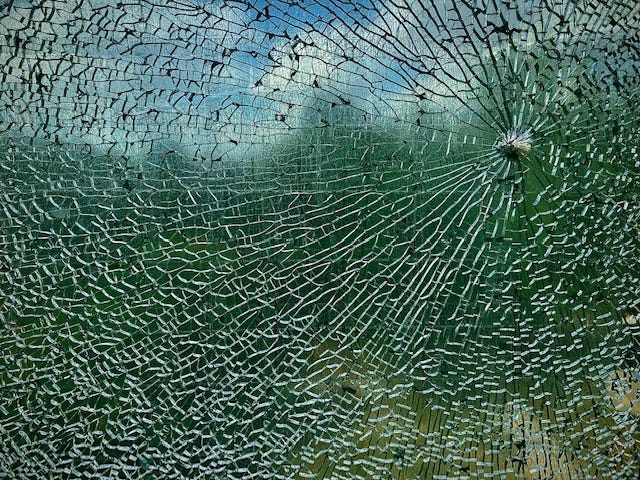
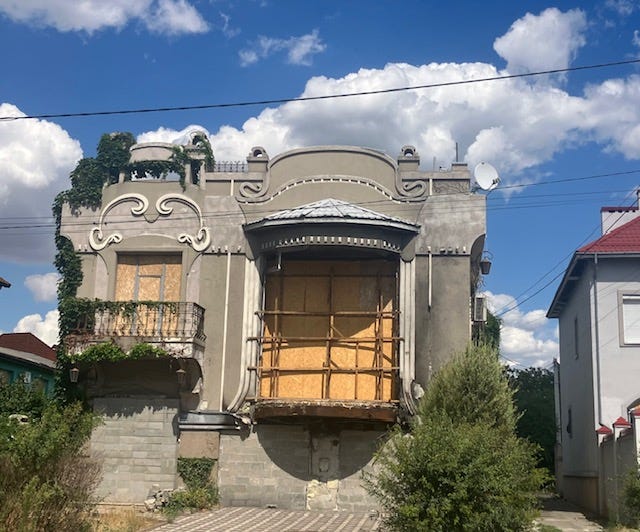
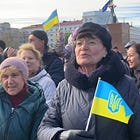
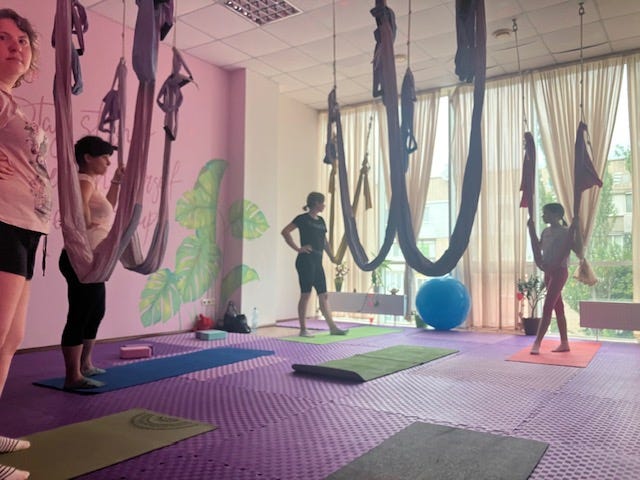

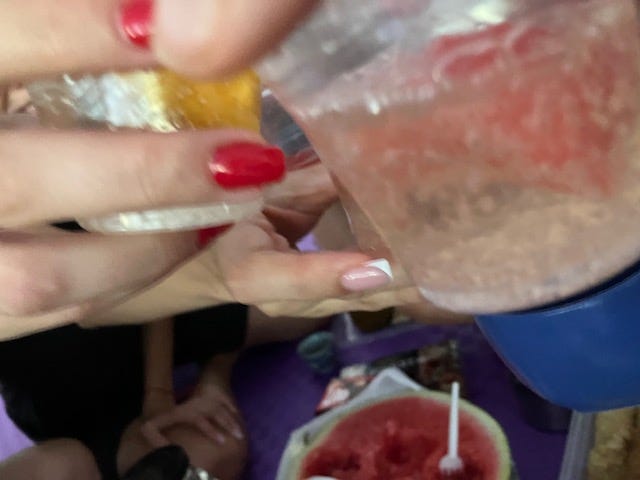
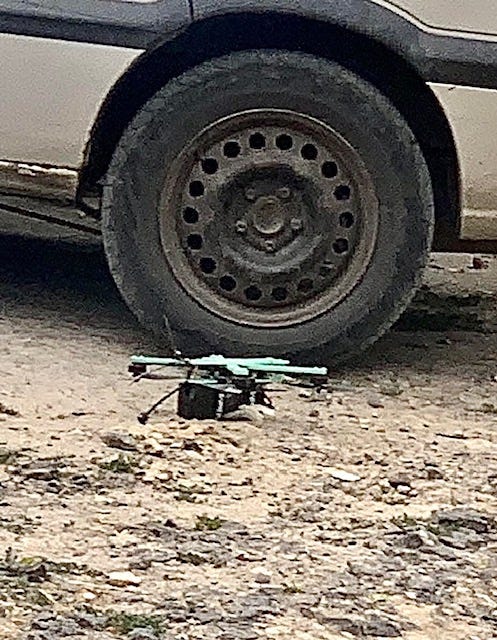
This journalists diary is gut wrenchingly brave and devastating... Hard to fathom, living life in the state of survival. Writing in total darkness like some sort of strange surrealism. Exposed and Unprotected.
My daughter, a journalist, covers crime in a college town and its surrounding cities.
I used to think her job was risky, dangerous at times. Interviewing families reporting on those who have tragically suffered loss.
Instead, I think how lucky we all are. Our safety and freedoms are protected.
The writer/journalist in the war zone sees a story as necessary for survival, urgently reporting on the events of war and the people that stayed. A community that doesn’t just exist. They live.
Thanks for sharing this writer, Greg, and thanks for making me think.
Slava Ukraine !🇺🇦
Zabrina your writing is amazing. Even in describing the insanity of Putins actions I can see it in my mind’s eyes. Stay safe and keep writing! Slava Ukraine